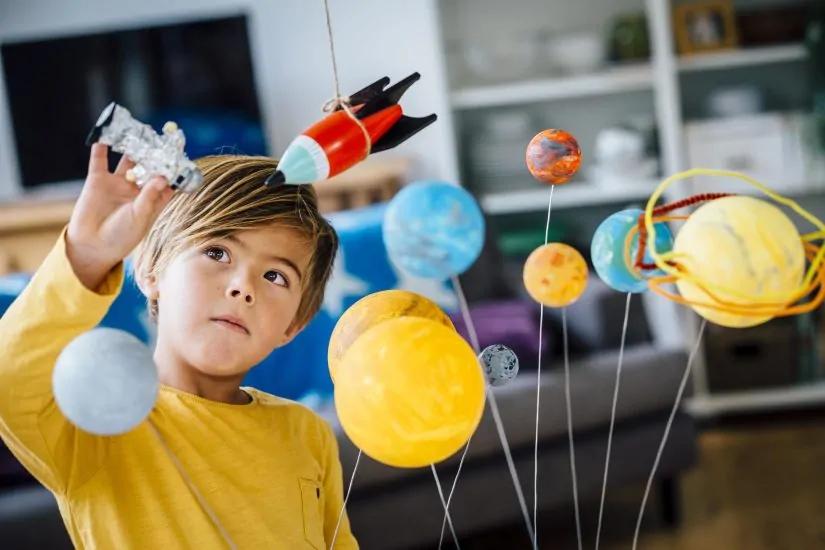Astronomy Day is the perfect opportunity to help young learners explore the mysteries of the universe through hands-on, interactive experiences. Whether you’re a parent, teacher, or tutor, there are countless ways to make space science for kids exciting and accessible. In this post, we’ll explore fun and educational astronomy activities for students that will make them feel like budding astrophysicists while also enhancing their STEM skills.
When children actively participate, they’re more likely to retain knowledge and develop a deeper understanding of our place in the cosmos. Celebrating Astronomy Day through interactive learning not only inspires young minds but also builds essential skills for future discovery and innovation.
These hands-on activities will helps kids feel excited about science:
1. Create a DIY Star Projector
One of the simplest and most engaging STEM activities for primary students is building a DIY star projector. All you need is a cardboard tube, some black construction paper, and a flashlight. Punch small holes in the paper to represent different constellations and shine the light through in a dark room.
This hands-on space activity allows children to:
-
Learn about constellations
-
Understand light projection
-
Develop fine motor skills
Looking for more ways to spark your child’s interest in STEM? A DIY star projector is a great starting point!
2. Host a Backyard Stargazing Night
Turn your backyard into a mini observatory by planning a stargazing evening. Use apps like Star Walk or SkyView to help students identify planets, stars, and constellations in the night sky.
This activity is perfect for:
-
Introducing the concept of celestial navigation
-
Observing real-time planetary movement
-
Discussing space science for kids in a real-world context
Make it even more educational by preparing a simple sky map in advance. This Astronomy Day idea brings together learning and leisure in a way that truly resonates with students.
3. Build a Model Solar System
Constructing a scale model of the solar system helps students visualise planetary sizes and distances. Use playdough, foam balls, or even fruit to represent different planets.
This type of educational astronomy activity promotes:
-
Spatial awareness
-
Understanding of orbits and planetary order
-
Creative thinking through crafting
Pair this with science tutoring to help reinforce key space concepts in a structured environment.
4. Create Craters with a “Moon Surface” Experiment
Simulate moon craters using flour, cocoa powder, and small pebbles or marbles. Drop objects from different heights and observe how they affect the surface, drawing comparisons to real meteor impacts.
Why this is a great hands-on space activity:
-
Demonstrates scientific concepts like force and impact
-
Encourages hypothesis and observation
-
Can be tailored for different age groups
Looking to support younger learners with science? Our tutoring for primary school students can help build foundational knowledge in fun and interactive ways.
5. Design a Space Mission Poster
Let students dream big by designing their own space mission. They can draw rockets, name planets, and create a backstory for their exploration.
This astronomy activity for students enhances:
-
Imagination and storytelling
-
Art integration with science
-
Teamwork if done as a group project
It’s also an excellent way to wrap up a themed day of educational astronomy activities with a creative showcase.
Why Astronomy Day Matters
Astronomy Day isn’t just about telescopes and stars—it’s about helping children discover how vast and fascinating our universe is. By incorporating these astronomy activities for students, you’re not only fostering scientific literacy but also building curiosity, creativity, and confidence.
If you’re looking for more engaging STEM activities for primary students, make Astronomy Day your launchpad into space science fun.
How Tutor Doctor Can Help Students Learn About Astronomy
Our tutors help students learn about astronomy and STEM by providing personalised support tailored to each student’s learning style and pace. They break down complex scientific concepts into manageable parts, making them easier to understand.
At Tutor Doctor we encourage curiosity and critical thinking by asking guiding questions and promoting problem-solving. By linking topics to real-world examples and current discoveries, we strive to make learning relevant and engaging.
Need extra support bringing space science to life? Science tutoring can reinforce concepts and ignite long-term interest in STEM. Contact us for a free consultation.




